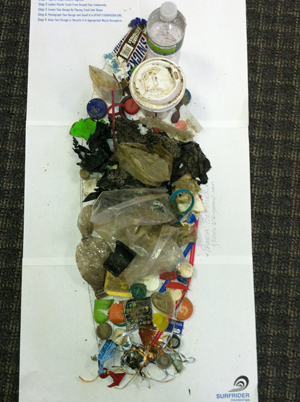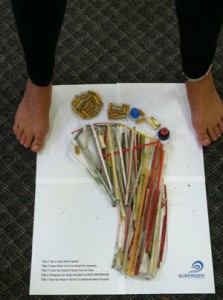66 million years from now, what will archaeologists think of this civilization that killed its mother, the Earth? On a chilly, drizzly Saturday, G3’s Pamela Berstler had an opportunity to ponder that question while scouring the beaches of Monmouth County, New Jersey for plastic trash. One didn’t have to look very far. Less than 10 minutes was required to find a square foot of plastic for the Surfrider South Jersey Chapter’s submissions to the One Foot At A Time campaign, part of Surfrider Foundation’s RAPtoberfest (RAP = Rise Above Plastics).
66 million years ago, toward the end of the Cretaceous Period, the very beach which we were scouring was deep under water. For those of you who are sketchy on Earth’s pre-history, approximately 65 million years or so ago (give or take half a million years) an asteroid plunged into the Earth, setting off a series of chain-reactions that resulted in the mass extinction of the dinosaurs. Now, this extinction was nothing in comparison with the Permian Extinction, some 250 million years ago, when nearly 99% of all species were eradicated from the earth. No, this Extinction did away mostly with the lumbering reptiles and dinosaurs (think top of the food chain), but plants and other creatures managed to survive.
According to an article in the October 10, 2011 New Yorker Magazine, Monmouth County, New Jersey is a prime place for archaeologists to uncover fossils and records from the Cretaceous Period, allowing them to piece together the story of the passing of the dinosaurs. How ironic that, at the same time scientists are chiseling away at rock to discover the past, we Surfrider members would be combing the beach for evidence of the coming plastic asteroid which will pollute the ocean so thoroughly that the very existence of humankind may be at risk. Take a look at the haul we took from that Monmouth Beach.



